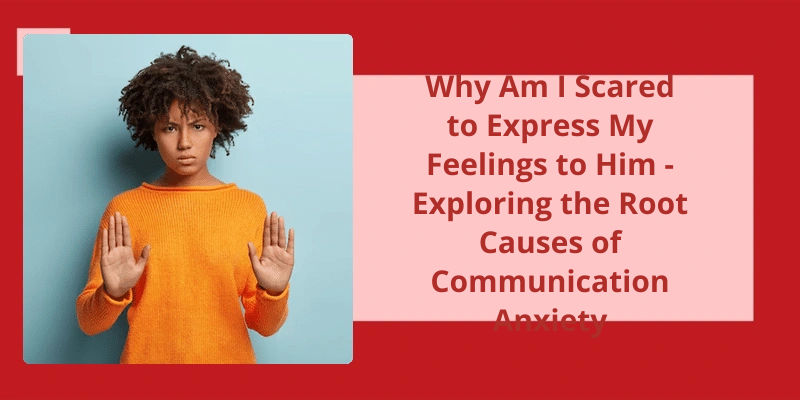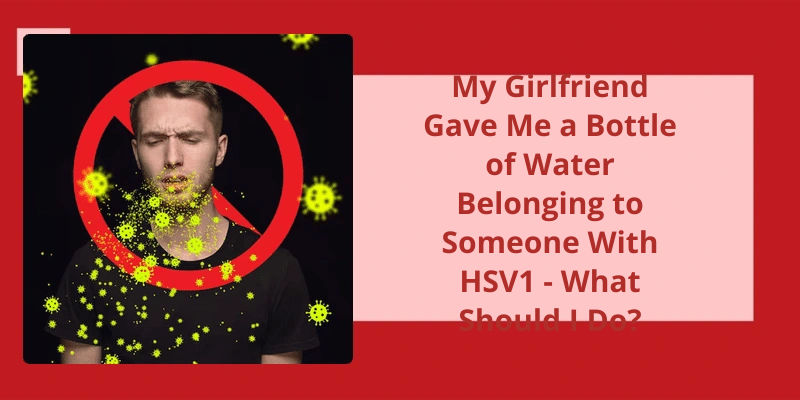Expressing your emotions to someone can be a daunting task, particularly when it involves someone you care about deeply. Whether it's fear of rejection, uncertainty about their feelings towards you, or simply the fear of vulnerability, it's not uncommon to feel apprehensive about revealing your true emotions. These fears can stem from past experiences or a lack of confidence in yourself and your ability to connect with others. Holding back your feelings, however, can lead to more significant problems, including misunderstandings, missed opportunities, and a loss of intimacy in the relationship. Therefore, it's essential to identify the reasons behind your fear of expressing your feelings and work towards overcoming them to create a healthier and happier connection with the person you care about.
When You Can’t Express Your Feelings in a Relationship?
It’s not uncommon to struggle with expressing your emotions in a relationship. Sometimes it can feel overwhelming or even scary to open up and share your innermost thoughts and feelings with someone else. There might be a fear of rejection, or even a fear of vulnerability. However, it’s important to remember that communication is key in any relationship, and being able to express yourself honestly and openly can help strengthen your connection with your partner.
One reason you might have difficulty expressing your emotions could be due to past experiences. If youve been hurt in the past, it can be hard to trust someone else with your feelings. You might feel like it’s safer to keep your emotions bottled up, rather than risk being hurt again. However, by not expressing your feelings, youre also limiting the intimacy and vulnerability in your relationship.
Another reason you might struggle to express your feelings could be due to differences in communication styles with your partner. Everyone communicates differently, and if you and your partner have different ways of expressing yourselves, it can create misunderstandings or even lead to arguments. Couples counseling can help you and your partner understand each others communication styles better, and find ways to bridge any gaps.
In some cases, you might not even be aware of the emotions youre feeling. This can happen when youre experiencing something new or overwhelming, such as the beginning stages of a new relationship. This is where therapy, either alone or as a couple, can be helpful. A therapist can help you better understand and identify your emotions, and give you tools to express them in a healthy way.
Ultimately, if youre having difficulty expressing your emotions in your relationship, it’s important to seek help. Bottling up your emotions can lead to resentment and distance in your relationship, while being able to communicate openly and honestly can help strengthen your connection with your partner. Couples counseling can be a safe space to explore what might be preventing you from expressing your emotions, and give you tools to build a more intimate and emotionally nurturing relationship.
However, it’s important to understand that holding in your emotions can lead to negative consequences and impact your mental health. In this article, we’ll explore some of the reasons why you might be afraid to show your feelings and offer some tips on how to overcome this fear.
Why Am I Afraid to Show My Feelings?
Additionally, some people might have grown up in an environment where showing emotions wasnt encouraged or was even frowned upon. This can lead to feeling uncomfortable or ashamed when expressing oneself emotionally. If youve been told to “toughen up” or “stop crying” as a child, it’s understandable that you might feel reluctant to express vulnerability as an adult.
Another reason for being afraid to show feelings is past experiences of rejection or abandonment. If youve been hurt in the past by someone who you thought cared for you, it can become hard to trust others and open up emotionally. In this case, fear can lead to self-protective behaviors, such as avoiding intimacy or intentionally distancing oneself from others when emotions start to surface.
Mental health issues can also play a role in being afraid to show feelings. Depression, anxiety, and PTSD can all make it feel like too much energy to express emotions. For some, emotions can feel overwhelming, and the vulnerability of expression can feel like a burden. In other cases, fear of judgment can lead to feelings of shame around emotions, adding another layer of complexity.
Not being sure how to express certain feelings can also contribute to fear around emotional expression. If you don’t know how to express an emotion, it can feel easier to just avoid expressing it altogether. This can especially true for people who struggle with emotional regulation or understanding emotions in others. In this case, learning more about emotions and how to express them can help reduce fear.
Finally, some people may just feel generally uncomfortable with vulnerability. They may have a preference for keeping things to themselves, or feel that expressing emotions is just not part of their personality. With some self-exploration and therapy, it’s possible to learn to embrace vulnerability and feel more comfortable expressing ones emotions.
Source: Why You Should Stop Hiding Feelings – Healthline
However, bottling up our emotions can lead to negative consequences such as stress, anxiety, and even physical health problems. Therefore, it’s important to find ways to openly express our emotions and work through the discomfort.
Why Does Expressing My Feelings Make Me Uncomfortable?
It’s understandable why expressing our emotions can be uncomfortable, as we’ve been conditioned to believe that showing our true feelings is a sign of weakness. Society often portrays vulnerability as undesirable and we’re faced with unrealistic expectations to always maintain a facade of strength. As a result, people may find it difficult to open up and express their emotions, even when they’re in environments that are supposed to be supportive.
However, it’s important to remember that expressing our feelings is healthy and an important part of emotional growth and maturity. We should work towards breaking down the societal barriers that prevent us from expressing ourselves and creating environments where we feel safe to be vulnerable and open with others.
Expressing love can be a daunting experience for some individuals, and it’s okay to feel apprehensive about it. However, taking the initiative and saying “I love you” first is entirely acceptable, according to dating expert Ettin.
Is It Normal to Be Scared to Say I Love You?
It’s understandable that people may feel scared to utter those three little words, as they hold such profound meaning and vulnerability. When you say “I love you” to someone, youre essentially putting your heart on the line and opening yourself up to potential rejection or an unrequited response. This fear can be amplified if you’re unsure that your partner loves you back or if you fear that the love may not be reciprocated in the same way.
The fear of saying “I love you” can also be rooted in past experiences. If youve been hurt or rejected in the past, you may carry this baggage into new relationships and be hesitant to express your feelings. Additionally, societal expectations and gender roles can play a role in this fear. Men may feel pressure to be strong and not show vulnerability, while women may fear being perceived as too needy or clingy.
Despite the fear and potential risks, expressing love is an important part of any relationship. Holding back your feelings can prevent true intimacy and may lead to feelings of resentment or frustration. It’s important to communicate your feelings openly and honestly, even if it’s scary to do so. If youre too scared to outright say “I love you,” try starting with a heartfelt compliment or sharing a special memory you’ve together.
Ultimately, saying “I love you” is a highly personal decision that should be made when it feels right for you. It’s not a race or a competition, and theres no shame in taking your time or waiting for the right moment. Love is a beautiful thing, but it can also be scary and complicated. Just remember to be patient, honest, and true to your own feelings when navigating this emotional territory. And if your partner truly cares for you, they’ll appreciate your honesty and vulnerability, no matter how scary it may be to say those three little words.
How to Overcome the Fear of Saying “I Love You”
The fear of saying “I love you” can be overcome by understanding that it’s a vulnerable and courageous act, practicing expressing emotions in other ways, focusing on the positive outcomes of saying it, and communicating openly with your partner.
Communicating your feelings can be intimidating, especially when it comes to expressing love. However, keeping your emotions hidden can create unnecessary tension and uncertainty in your relationship. It’s important to be honest and open with your partner, even if it means putting yourself in a vulnerable position. With that said, let’s delve deeper into the reasons why you shouldn’t be scared to tell someone you love them.
Should I Be Scared to Tell Someone I Love Them?
It’s understandable to feel scared to tell someone that you love them. Putting yourself out there and sharing your feelings with someone can be daunting. However, it’s important to remember that love is a natural and beautiful thing. If you feel strongly about someone, it’s worth taking the risk to tell them.
It’s important to have an open and honest conversation with your partner about your feelings. Make sure to find a time and place where you both feel comfortable and can have a meaningful discussion. Sharing your love can deepen your emotional connection and bring you closer together.
Remember that love is a two-way street. If they don’t feel the same way, it doesn’t mean that theres anything wrong with you. People have different preferences and feelings, and it’s important to respect that.
It’s also important to consider the timing of your confession. Make sure that you and your partner are in a good place in your relationship and that theyre not dealing with any major stressors or issues. It’s important to approach the conversation with sensitivity and compassion.
At the end of the day, telling someone that you love them can be a wonderful and rewarding experience. It can deepen your emotional connection and bring you closer together. Even if the response isnt what youre expecting, remember that your feelings are valid and it’s important to be true to yourself.
Conclusion
In conclusion, the fear of expressing one's feelings to another person is a natural and common experience that many people have encountered in their lives. It can stem from a variety of factors such as fear of rejection, uncertainty about the other person's feelings, and past experiences that have shaped one's beliefs about vulnerability and emotional expression. However, it’s important to recognize that expressing one's feelings is a fundamental part of building healthy relationships and shouldn’t be avoided or suppressed. By acknowledging and facing our fears, we open ourselves up to the possibility of deepening connections and discovering true intimacy with others. Ultimately, while it may be difficult to overcome the fear of expressing our feelings, the rewards of doing so can be immeasurable and truly life-changing.






